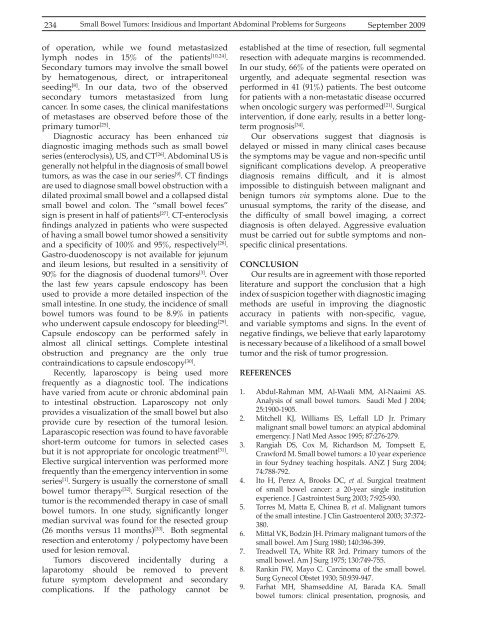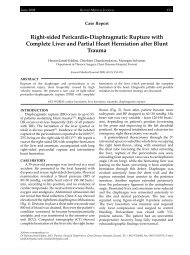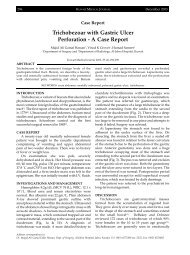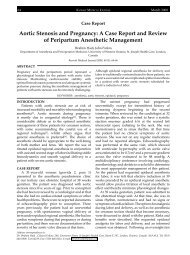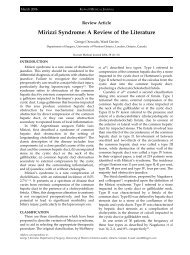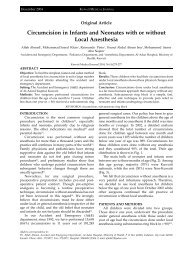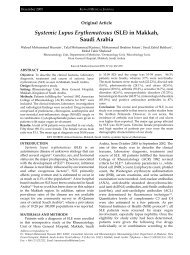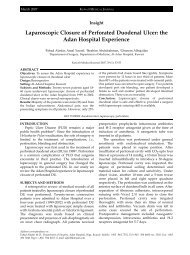Vol 41 # 3 September 2009 - Kma.org.kw
Vol 41 # 3 September 2009 - Kma.org.kw
Vol 41 # 3 September 2009 - Kma.org.kw
Create successful ePaper yourself
Turn your PDF publications into a flip-book with our unique Google optimized e-Paper software.
234<br />
Small Bowel Tumors: Insidious and Important Abdominal Problems for Surgeons<br />
<strong>September</strong> <strong>2009</strong><br />
of operation, while we found metastasized<br />
lymph nodes in 15% of the patients [10,24] .<br />
Secondary tumors may involve the small bowel<br />
by hematogenous, direct, or intraperitoneal<br />
seeding [8] . In our data, two of the observed<br />
secondary tumors metastasized from lung<br />
cancer. In some cases, the clinical manifestations<br />
of metastases are observed before those of the<br />
primary tumor [25] .<br />
Diagnostic accuracy has been enhanced via<br />
diagnostic imaging methods such as small bowel<br />
series (enteroclysis), US, and CT [26] . Abdominal US is<br />
generally not helpful in the diagnosis of small bowel<br />
tumors, as was the case in our series [9] . CT findings<br />
are used to diagnose small bowel obstruction with a<br />
dilated proximal small bowel and a collapsed distal<br />
small bowel and colon. The “small bowel feces”<br />
sign is present in half of patients [27] . CT-enteroclysis<br />
findings analyzed in patients who were suspected<br />
of having a small bowel tumor showed a sensitivity<br />
and a specificity of 100% and 95%, respectively [28] .<br />
Gastro-duodenoscopy is not available for jejunum<br />
and ileum lesions, but resulted in a sensitivity of<br />
90% for the diagnosis of duodenal tumors [3] . Over<br />
the last few years capsule endoscopy has been<br />
used to provide a more detailed inspection of the<br />
small intestine. In one study, the incidence of small<br />
bowel tumors was found to be 8.9% in patients<br />
who underwent capsule endoscopy for bleeding [29] .<br />
Capsule endoscopy can be performed safely in<br />
almost all clinical settings. Complete intestinal<br />
obstruction and pregnancy are the only true<br />
contraindications to capsule endoscopy [30] .<br />
Recently, laparoscopy is being used more<br />
frequently as a diagnostic tool. The indications<br />
have varied from acute or chronic abdominal pain<br />
to intestinal obstruction. Laparoscopy not only<br />
provides a visualization of the small bowel but also<br />
provide cure by resection of the tumoral lesion.<br />
Laparascopic resection was found to have favorable<br />
short-term outcome for tumors in selected cases<br />
but it is not appropriate for oncologic treatment [31] .<br />
Elective surgical intervention was performed more<br />
frequently than the emergency intervention in some<br />
series [1] . Surgery is usually the cornerstone of small<br />
bowel tumor therapy [32] . Surgical resection of the<br />
tumor is the recommended therapy in case of small<br />
bowel tumors. In one study, significantly longer<br />
median survival was found for the resected group<br />
(26 months versus 11 months) [33] . Both segmental<br />
resection and enterotomy / polypectomy have been<br />
used for lesion removal.<br />
Tumors discovered incidentally during a<br />
laparotomy should be removed to prevent<br />
future symptom development and secondary<br />
complications. If the pathology cannot be<br />
established at the time of resection, full segmental<br />
resection with adequate margins is recommended.<br />
In our study, 66% of the patients were operated on<br />
urgently, and adequate segmental resection was<br />
performed in <strong>41</strong> (91%) patients. The best outcome<br />
for patients with a non-metastatic disease occurred<br />
when oncologic surgery was performed [21] . Surgical<br />
intervention, if done early, results in a better longterm<br />
prognosis [34] .<br />
Our observations suggest that diagnosis is<br />
delayed or missed in many clinical cases because<br />
the symptoms may be vague and non-specific until<br />
significant complications develop. A preoperative<br />
diagnosis remains difficult, and it is almost<br />
impossible to distinguish between malignant and<br />
benign tumors via symptoms alone. Due to the<br />
unusual symptoms, the rarity of the disease, and<br />
the difficulty of small bowel imaging, a correct<br />
diagnosis is often delayed. Aggressive evaluation<br />
must be carried out for subtle symptoms and nonspecific<br />
clinical presentations.<br />
CONCLUSION<br />
Our results are in agreement with those reported<br />
literature and support the conclusion that a high<br />
index of suspicion together with diagnostic imaging<br />
methods are useful in improving the diagnostic<br />
accuracy in patients with non-specific, vague,<br />
and variable symptoms and signs. In the event of<br />
negative findings, we believe that early laparotomy<br />
is necessary because of a likelihood of a small bowel<br />
tumor and the risk of tumor progression.<br />
REFERENCES<br />
1. Abdul-Rahman MM, Al-Waali MM, Al-Naaimi AS.<br />
Analysis of small bowel tumors. Saudi Med J 2004;<br />
25:1900-1905.<br />
2. Mitchell KJ, Williams ES, Leffall LD Jr. Primary<br />
malignant small bowel tumors: an atypical abdominal<br />
emergency. J Natl Med Assoc 1995; 87:276-279.<br />
3. Rangiah DS, Cox M, Richardson M, Tompsett E,<br />
Crawford M. Small bowel tumors: a 10 year experience<br />
in four Sydney teaching hospitals. ANZ J Surg 2004;<br />
74:788-792.<br />
4. Ito H, Perez A, Brooks DC, et al. Surgical treatment<br />
of small bowel cancer: a 20-year single institution<br />
experience. J Gastrointest Surg 2003; 7:925-930.<br />
5. Torres M, Matta E, Chinea B, et al. Malignant tumors<br />
of the small intestine. J Clin Gastroenterol 2003; 37:372-<br />
380.<br />
6. Mittal VK, Bodzin JH. Primary malignant tumors of the<br />
small bowel. Am J Surg 1980; 140:396-399.<br />
7. Treadwell TA, White RR 3rd. Primary tumors of the<br />
small bowel. Am J Surg 1975; 130:749-755.<br />
8. Rankin FW, Mayo C. Carcinoma of the small bowel.<br />
Surg Gynecol Obstet 1930; 50:939-947.<br />
9. Farhat MH, Shamseddine AI, Barada KA. Small<br />
bowel tumors: clinical presentation, prognosis, and


